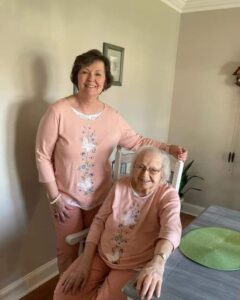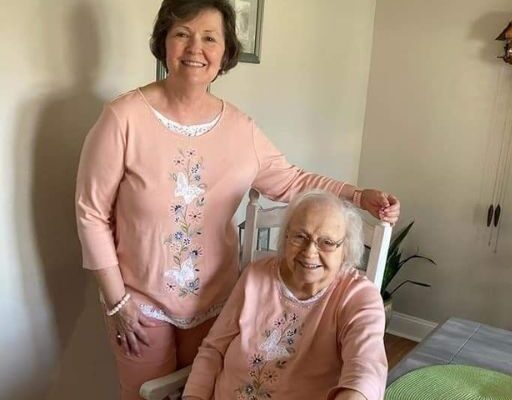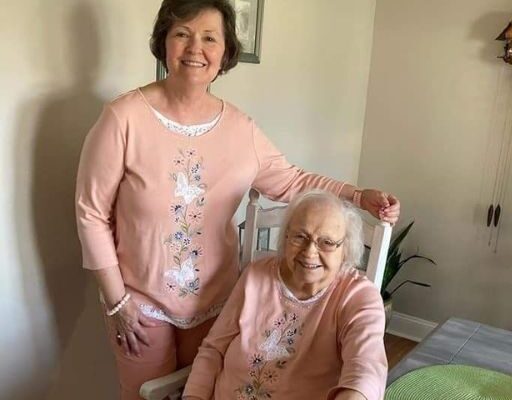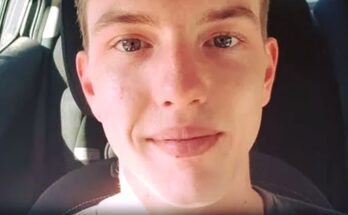MY MOM MOVED IN WITH ME LAST MONTH—BUT YESTERDAY, SHE CALLED ME BY A NAME I’VE NEVER HEARD HER SAY BEFORE
I thought I was ready for this.
After her second fall, it just made sense. The house was too much for her. She needed someone close, and I had the space. So she moved into the guest room, and we tried to make it feel like home. Matching outfits, favorite meals, soft music playing in the kitchen. It was actually… kind of sweet.

But little things started happening.
She kept insisting we set two extra plates, even when it was just us. I figured it was part of the memory lapses her doctor mentioned.
Then last week, I caught her standing in the hallway at 2 a.m., facing the wall like she was waiting for someone to open a door that didn’t exist.
But yesterday was different.
We were sitting down for dinner, just the two of us, like we’d done a dozen times since she moved in. The sun was setting, casting a warm orange glow over the table. I had made her favorite, chicken pot pie, and we sat together, chatting about the little things—her garden, the neighbor’s dog, a book I’d given her that she hadn’t started yet. It was an ordinary night, or at least, that’s what I thought.
As I served the last portion of the meal onto her plate, she looked up at me and smiled—except this time, the smile didn’t quite reach her eyes. There was a weird, vacant look behind them, like she wasn’t really seeing me, just a shadow of who I was. Then she did something that stopped me cold.
“Thank you, Emma,” she said, her voice soft, almost tender.
Emma?
I froze mid-motion, holding the ladle over my plate. I looked at her, trying to process what she had just said. “Mom, who’s Emma?”
She blinked, as though confused by the question. “You, of course. Emma. You’ve always been Emma.”
My heart skipped a beat. Emma? I’ve never heard her call me that before—not once in my life. My name is Sarah. I was about to brush it off as another memory lapse, another small symptom of the early stages of Alzheimer’s we’d been told to expect. But something about the way she said it, so calmly and without hesitation, made my stomach churn.
“Mom, my name’s Sarah,” I said, trying to keep my voice steady, though my pulse was racing. “You’ve always called me Sarah.”
She didn’t respond at first. She just looked at me like I’d asked her the strangest question. After a long, uncomfortable pause, she set down her fork and sighed, running her hand through her graying hair.
“I don’t know what you’re talking about. You’re Emma. I remember when you were little, playing in the garden with your doll, just like Emma used to. You were always such a bright little thing.”
I stared at her, trying to make sense of her words. She wasn’t just forgetting my name—she seemed to be in a completely different time, a time before I was even born. My head was spinning.
“Mom… do you mean someone else? Is there an Emma you knew from… from the past?” I asked, though my voice felt weak, unsure of where I was even going with the question.
But she just stared at me with that faraway look in her eyes. It was like she wasn’t really there with me. The woman who had raised me, the woman who had been a steady presence in my life, was fading, bit by bit.
I spent the rest of the evening trying to distract myself. I washed the dishes and took a long walk around the block, trying to clear my head. But nothing made sense. I kept coming back to one question: Who is Emma?
Later that night, after I’d tucked her in and kissed her goodnight, I sat down in the living room, turning over the pieces of the puzzle in my mind. I had to get to the bottom of this. I needed answers.
It was then that I remembered something. When I was a child, I’d always had an imaginary friend. Her name was… Emma. I had completely forgotten about her until now, but I distinctly remembered playing with a little girl named Emma when I was around five or six. I never told my parents about her. I had no idea why I’d made her up. And I certainly hadn’t thought of Emma in decades.
But now, I couldn’t shake the feeling that there was more to this. Could my mom have known about Emma? Could she have somehow connected me to this imaginary friend all these years later?
The next morning, I went through old family photo albums. I wasn’t sure why, but I felt a pull, as if something in those old pictures would tell me what was going on. And then, in one of the albums, I found it—a picture from when I was about five. It was a photo of me standing in front of our house, smiling wide, holding a small, raggedy doll in my hand. I was playing outside with someone, but in the photo, the other little girl wasn’t there. Just me, alone.
But then I noticed something else, something that made my blood run cold. In the background, behind me, was my mom—looking straight at the camera, but there was a strange, almost sad expression on her face. She wasn’t looking at me, or anyone else. She looked like she was looking at something beyond me, at something only she could see.
My breath caught in my throat. Could she have been seeing Emma back then? Was she somehow aware of her presence?
Later that day, I decided to call her longtime friend, Nancy. Nancy had always been a part of our family’s life, someone who had known us both for years. If anyone knew anything, it would be her.
When I explained the situation, there was a long pause on the other end of the line. “Sarah, honey,” Nancy’s voice broke through, sounding a little shaken, “there’s something you need to know.”
I listened, my heart pounding in my chest.
“Your mom… she had a baby before you. I’m not sure of all the details, but it was a long time ago. It wasn’t talked about much, but… she had a little girl named Emma. She passed away when she was only a year old.”
The room spun. I could barely process the words. Emma hadn’t been an imaginary friend at all. She had been real.
Nancy explained that my mom had never fully recovered from the loss. She carried the weight of it with her, and after Emma’s death, she had never been the same. In the years that followed, she had stopped talking about Emma, but the memory never fully left her.
“I think your mom’s mind is trying to make peace with it,” Nancy said gently. “The way she’s been calling you Emma… it might be her way of keeping her alive in her heart. She may have never fully let go of her.”
My chest tightened, and I felt a lump in my throat. For all these years, my mom had been living with the quiet pain of losing a child, and I had no idea. I had always thought of her as strong and unshakable, but in reality, she had been carrying a hidden sorrow all along.
The next time I saw her, I sat down next to her, holding her hand in mine. This time, I didn’t correct her when she called me Emma. Instead, I softly whispered, “I know who Emma is, Mom. And I know you loved her so much.”
She looked at me, her eyes welling up with tears. “I never wanted to forget her,” she said, her voice trembling. “I didn’t want to hurt you, but I couldn’t let go of her.”
I squeezed her hand tighter. “I know, Mom. And I’ll always be here for you. No matter what.”
In that moment, I realized that sometimes the pain we carry is so deep, we bury it so far inside ourselves, thinking we can never share it with others. But the truth always finds a way out, and when it does, it can bring healing—not just for the one who’s been hurting, but for everyone around them too.
And so, I let my mom’s grief be a part of our life, no longer hidden or forgotten. I promised her that I would always carry the memory of Emma, too. Because in the end, love and loss aren’t meant to be locked away. They’re meant to be shared.
If you’ve ever carried a hidden pain or loss, remember this: sometimes, letting others in is the first step toward healing. And it’s okay to ask for help.
Please share this with someone who might need a reminder that love is stronger than our grief.




